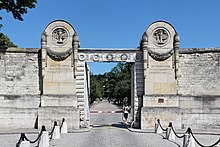Cimetière du Père-Lachaise
 |
|
| Details | |
|---|---|
| Established | 1804 |
| Location | Paris |
| Country | France |
| Coordinates | 48°51′36″N 2°23′46″E / 48.860°N 2.396°E |
| Type | Public, non-denominational |
| Size | 44 hectares (110 acres) |
| Number of interments | Over one million |
| Find a Grave | Cimetière du Père-Lachaise |
Père Lachaise Cemetery (French: Cimetière du Père-Lachaise, [simtjɛːʁ dy pɛːʁ laʃɛːz]; formerly, cimetière de l'Est, "East Cemetery") is the largest cemetery in the city of Paris (44 hectares or 110 acres), though there are larger cemeteries in the city's suburbs.
Père Lachaise is in the 20th arrondissement and is notable for being the first garden cemetery, as well as the first municipal cemetery. It is also the site of three World War I memorials.
The cemetery is on Boulevard de Mènilmontant. The Paris Métro station Philippe Auguste on line 2 is next to the main entrance, while the station called Père Lachaise, on both lines 2 and 3, is 500 metres away near a side entrance that has been closed to the public. Many tourists prefer the Gambetta station on line 3, as it allows them to enter near the tomb of Oscar Wilde and then walk downhill to visit the rest of the cemetery.
Each year, Père Lachaise Cemetery welcomes over 3.5 million visitors, making it the most visited cemetery in the world.
The cemetery takes its name from the confessor to Louis XIV, Père François de la Chaise (1624–1709), who lived in the Jesuit house rebuilt in 1682 on the site of the chapel. The property, situated on the hillside from which the king watched skirmishing between the Condé and Turenne during the Fronde, was bought by the city in 1804. Established by Napoleon in this year, the cemetery was laid out by Alexandre-Théodore Brongniart and later extended.
...
Wikipedia

